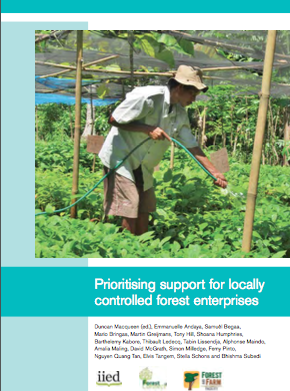Book And Manuals
Prioritising support for locally controlled forest enterprises
 Author: Duncan Macqueen (ed.), Emmanuelle Andaya, Samuêl Begaa, Mario Bringas, Martin Greijmans, Tony Hill, Shoana Humphries, Barthelemy Kabore, Thibault Ledecq, Tabin Lissendja, Alphonse Maindo, Amalia Maling, David McGrath, Simon Milledge, Femy Pinto, Nguyen Quang Tan, Elvis Tangem, Stella Schons and Bhishma Subedi
Author: Duncan Macqueen (ed.), Emmanuelle Andaya, Samuêl Begaa, Mario Bringas, Martin Greijmans, Tony Hill, Shoana Humphries, Barthelemy Kabore, Thibault Ledecq, Tabin Lissendja, Alphonse Maindo, Amalia Maling, David McGrath, Simon Milledge, Femy Pinto, Nguyen Quang Tan, Elvis Tangem, Stella Schons and Bhishma Subedi
Publisher: International Institute for Environment and Development (IIED)
Language: English
Date of Publication: May 2014
Number of Pages: 232+15
Price: Free
This book provides, in eight very different country contexts, which subsectors should be prioritized for support on account of their likely social and environmental impacts. Chapter 1 describes in more detail the rationale and terms of reference of those background papers – chosen to represent a wide spread of forest ecosystems across Africa, Asia and Latin America. The main body of this book (chapters 2-9) comprises a detailed assessment of the likely impacts of small-enterprise support across different forest subsectors in each of the eight countries (which, in the order of the chapters, are Nepal, Brazil, Burkina Faso, Vietnam, Mexico, Tanzania, Cambodia and the Democratic Republic of the Congo). The teams first assessed the economic prospects of each locally controlled forest subsector and then evaluated the likely impacts against seven impact criteria: (i) income-generating potential; (ii) gender balance in such income generation; (iii) contribution to food security; (iv) contribution to energy security; (v) contribution to climate change mitigation and adaptation; (vi) biodiversity; and (vii) capacity to improve soil fertility without chemical nitrogen inputs. Chapter 10 analyses the divergences and similarities between countries, draws out lessons, and makes policy recommendations.
